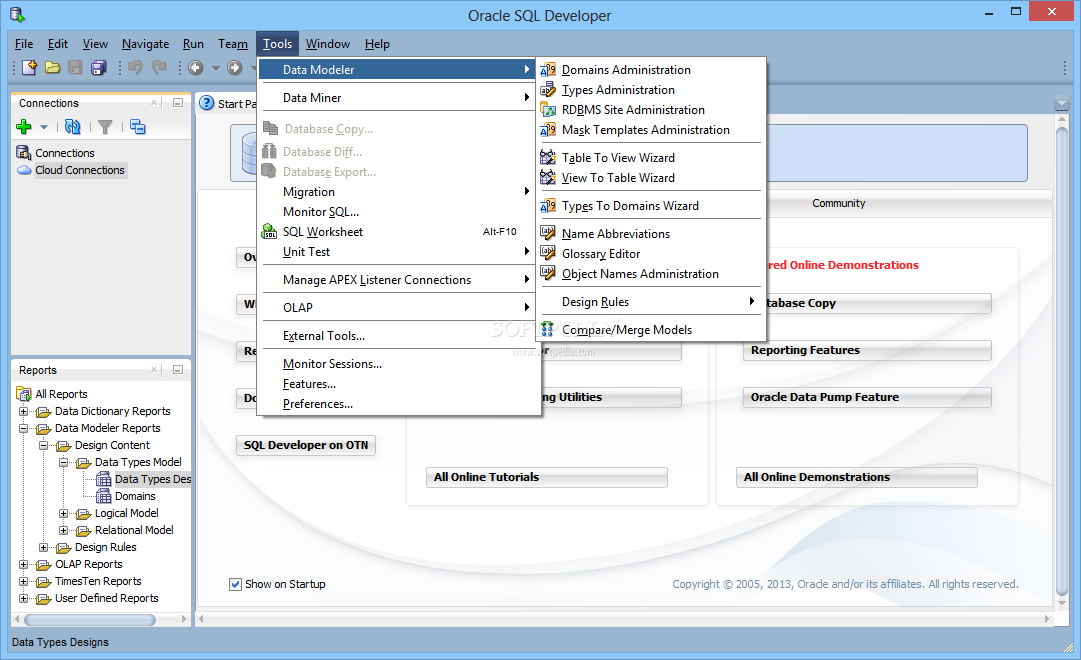

- MYSQL IN ORACLE SQL DEVELOPER MAC OS
- MYSQL IN ORACLE SQL DEVELOPER CODE
- MYSQL IN ORACLE SQL DEVELOPER PASSWORD
- MYSQL IN ORACLE SQL DEVELOPER FREE
It should also be chosen when flexibility is required in transaction control. If that large database also needs to be hosted, then choose Oracle SQL. If a high degree of scalability is required, and data is already estimated to be larger, Oracle SQL would be the better option. Mainly, those support engineers are looking for fixes on bugs, regular maintenance, and pushing security patches. For MySQL, there are technical support services available 24/7. Oracle SQL uses community support as well as a variety of support options for the paid product. That also helps to define the user roles.īecause Oracle owns both Oracle SQL and MySQL, there is support and documentation for both. That means if the profile is not set up, then the user cannot access it.
MYSQL IN ORACLE SQL DEVELOPER PASSWORD
With Oracle SQL, a username and password are required for logging in, but a profile also needs to be validated. But with the host, a username, and a password, users have access to the database. For example, in MySQL, a host needs to be identified. However, there are some small differences between the two.
MYSQL IN ORACLE SQL DEVELOPER CODE
Because it is open-source, the code can be altered for individual environments based on whatever requirements you may have.īoth MySQL and Oracle SQL have security such as usernames and passwords. Oracle SQL cannot be customized, as it is a closed source. They can be either executed or triggered by events. Oracle SQL, in comparison, supports Stored Procedures embedded in the database. Up until version 5, MySQL did not support Stored Procedures. MySQL supports all of those in addition to BSD, Symbian, and AmigaOS.
MYSQL IN ORACLE SQL DEVELOPER MAC OS
For example, Oracle SQL supports Windows, Mac OS X, Linux, Unix, and z/OS. Oracle SQL does not support as many operating systems when compared to MySQL. However, Oracle SQL supports both SQL and PL/SQL. However, MySQL supports some types that Oracle SQL does not. It can also work with both static and dynamic systems. Oracle SQL, however, supports data partitioning. MySQL does not support data partitioning and only works with static systems. Oracle SQL is designed to be large-scale and can support large quantities of data.
MYSQL IN ORACLE SQL DEVELOPER FREE
There is an express addition of Oracle SQL that is free to use, but that is recommended only for students to use.Īs far as scalability, MySQL can be used for both small and large businesses. That means without a license, you would not be able to use Oracle SQL. In comparison, however, Oracle SQL is developed to be commercial. It does so by following the ACID (atomicity, consistency, isolation, and durability) to maintain that integrity.Īs you know well by now, MySQL is an open-source database. Another major goal is the reliability of that data and ensuring the data’s integrity is maintained.

Oracle SQL is built to handle large quantities of data. Oracle SQL was also built to be scalable, portable, and easily programmable. This database management system was the first relational system to be developed to manipulate records within the database. Oracle SQL is a cross-platform management system, meaning it can be run on a variety of operating systems. It is a Relational Database Management System (RDBMS) that uses a commercial license. When referring to Oracle SQL, we are talking about Oracle Database. But we’ll at least look at some of the major differences. Like the other MySQL versus… articles, it isn’t going to be all-inclusive. Finally, we’ll compare some of the differences between MySQL and Oracle SQL. Just a short description of what it is and some of the details we’ll need to reference later. Like the others, we’ll first start with a brief overview of Oracle SQL. So that’s what we’ll be exploring in this article. But these two RDBMSs have more differences than just the syntax. In theory, every SQL language supported by different management systems should all be at least somewhat different. But that got me thinking, why not compare MySQL and Oracle SQL? They’re both owned by the same company, and yet they both seem very different when using. In my last MySQL article, I briefly mentioned that MySQL is owned by Oracle.


 0 kommentar(er)
0 kommentar(er)
